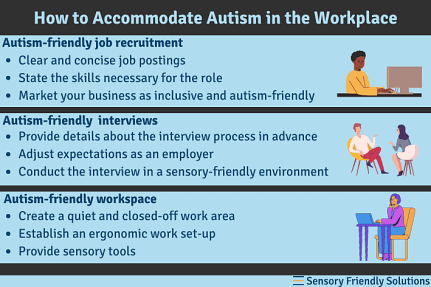New opportunities and challenges arise as individuals with ASD enter adulthood in the sphere of employment and independence. While atypical in many ways, many autistic adults can lead very rewarding lives with substantial careers and can often live independently with adequate support. We now turn to empowerment strategies that will help in employment and independence.
Understanding Autism in Adulthood
Autism is a lifelong condition, and there is much variation in the experiences of autistic adults. Whereas some adults will go on needing support for life, others are totally self-sufficient yet still have difficulties in social situations, have sensory problems, or cannot adapt to a new environment. The heterogeneity of autism means that each person’s journey to independence and employment is different-but it also suggests that support/resources must be tailored at each phase of adulthood.
Employment Issues Encountered by Autistic Adults
Employment seeking and maintenance are the most critical issues affecting autistic adults. These may be emanating from or in connection with:
- Communication Barriers: The inability to use social communication properly, read body language, or understand workplace dynamics might further complicate conducting interviews and meetings along with general interactions in the workplace.
- Sensory Sensitivities: Particular environments can be overwhelming due to differences in sensory processing. Too many bright lights, loud noises, or crowded offices can interfere with productivity and heighten anxiety.
- Accommodation and Understanding: Facilities in most workplaces are still lacking to enable a person with autism to perform optimally at work. Besides, several fallacies about autism lead to discriminating against people on the spectrum.
- Executive Functioning Challenges: Certain challenges for some adults on the autism spectrum lie in executive functioning skills such as time management, keeping things organized, or multitasking skills. They may have difficulties in meeting deadlines,
workloads, or prioritizing accordingly in tasks.
Employing Strategies
Many autistic adults do function well in employment with the right support. Here are some strategies that might help:
- Play to Strengths: Generally, people with autism have an increased attention to detail, intense focus on specified tasks, and
 specialized interests. These strengths can be extremely valuable in careers that require technology, research, engineering, data
specialized interests. These strengths can be extremely valuable in careers that require technology, research, engineering, data
analysis, and the arts. It is very important to find jobs that will utilize these strengths and help assure success over time.- Look for Autism-Friendly Employers: An increasing number of businesses appreciate neurodiversity and actively work to foster acceptance and inclusion within their ranks. Companies like Microsoft, SAP, and EY have developed special neurodiversity hiring programs targeting autistic employees. The programs mostly focus on strengths and avoid the conventional interview processes that may be intimidating for autistic candidates.
- Accommodation Request: All autistic employees have the right to request reasonable accommodations under the law, such as ADA. These can include flexible hours, the ability to work from home, modifications in the workspace-sensory-friendly-that is,
quieter areas or adjusting lighting, or possibly written instructions. Learning how to negotiate these accommodations is important. - Employ Job Coaching and Support Services: Interview preparation, job coaches, and employment support programs might facilitate adults with autism overcome specific job challenges or find ways to effectively carry out their job responsibilities.
The diverse services that would fall under the heading of support would include vocational rehabilitation services available in most communities. - Social Skills and Professional Development: Targeted training in social skills can be helpful to autistic individuals in learning how to navigate workplace dynamics. Training could emphasize the development of communication skills, the management of social interactions, and understanding the expectations within a workplace environment. Such programs are often provided by local autism support groups or occupational therapy services.
Understanding Independence
Independence is not merely a matter of finding work; it embraces all areas of everyday life such as personal care, living situations, and fiscal issues. Whereas many individuals with autism will aspire to independent living, they may well need support to enable them to live
independently. The following are some steps that may be taken to work toward independence:
- Life Skills Training: Teaching budgeting, cooking, personal care, and home maintenance can make quite a huge difference for an autistic adult to manage the day-to-day responsibilities. Occupational therapists, life coaches, or family members mayassist in such training.
- Supported or Assisted Living: Some autistic adults may want to consider supported or assisted living, where one is able to live independently but also has supports at hand. This may mean being part of a community offering shared support services or having a part-time support worker who attends to particular needs.
- Technology for Independence: Assistive technology can be used productively to further the cause of independent living. Apps and devices for time management, reminders, and organization assist the person on the autism spectrum in daily living. Examples of simplifying routines and enhancing independence are utilizing digital calendars, reminder apps, or smart home devices.
A support network of friends, relatives, mentors, or professional support services is vital. The networks will offer emotional support, guidance, and problem-solving against new challenges that might come up.
- Self-Advocacy Skills: Learning to advocate for oneself is crucial to independence. This ranges from knowing how to communicate their needs regarding requesting accommodations to asserting their boundaries in personal or professional contexts. Organizations like the Autistic Self Advocacy Network, or ASAN, provide resources that help individuals develop these skills.
Resources for Autistic Adults
There are a number of resources to help autistic adults navigate employment and independence. Here are a few helpful options:
- Autism Speaks Employment Tool Kit: This is an in-depth resource on how to find and maintain employment for individuals with autism.
- Autistic Self Advocacy Network (ASAN): The ASAN provides resources and encourages self-advocacy for autistic individuals.
Vocational Rehabilitation Services: Many areas offer these services, which include the preparation, placement, and follow-up employment for individuals with disabilities. - Job Accommodation Network (JAN): This is a resource used to answer work accommodation questions for individuals with disabilities.
Adulthood in autism is uniquely marked by challenges in the realms of employment and independence, but also by opportunities for growth, fulfillment, and success. Emphasizing strengths, self-advocating for accommodations when needed, and life skills building will prepare autistic adults to confidently master these aspects of life and to live a fulfilling personal and professional life. Supportive environments for autistic adults create more open doors toward independence and empowerment as society continues to embrace neurodiversity.





